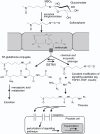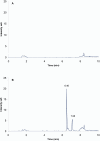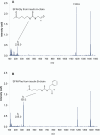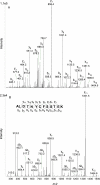Broccoli consumption interacts with GSTM1 to perturb oncogenic signalling pathways in the prostate
- PMID: 18596959
- PMCID: PMC2430620
- DOI: 10.1371/journal.pone.0002568
Broccoli consumption interacts with GSTM1 to perturb oncogenic signalling pathways in the prostate
Abstract
Background: Epidemiological studies suggest that people who consume more than one portion of cruciferous vegetables per week are at lower risk of both the incidence of prostate cancer and of developing aggressive prostate cancer but there is little understanding of the underlying mechanisms. In this study, we quantify and interpret changes in global gene expression patterns in the human prostate gland before, during and after a 12 month broccoli-rich diet.
Methods and findings: Volunteers were randomly assigned to either a broccoli-rich or a pea-rich diet. After six months there were no differences in gene expression between glutathione S-transferase mu 1 (GSTM1) positive and null individuals on the pea-rich diet but significant differences between GSTM1 genotypes on the broccoli-rich diet, associated with transforming growth factor beta 1 (TGFbeta1) and epidermal growth factor (EGF) signalling pathways. Comparison of biopsies obtained pre and post intervention revealed more changes in gene expression occurred in individuals on a broccoli-rich diet than in those on a pea-rich diet. While there were changes in androgen signalling, regardless of diet, men on the broccoli diet had additional changes to mRNA processing, and TGFbeta1, EGF and insulin signalling. We also provide evidence that sulforaphane (the isothiocyanate derived from 4-methylsuphinylbutyl glucosinolate that accumulates in broccoli) chemically interacts with TGFbeta1, EGF and insulin peptides to form thioureas, and enhances TGFbeta1/Smad-mediated transcription.
Conclusions: These findings suggest that consuming broccoli interacts with GSTM1 genotype to result in complex changes to signalling pathways associated with inflammation and carcinogenesis in the prostate. We propose that these changes may be mediated through the chemical interaction of isothiocyanates with signalling peptides in the plasma. This study provides, for the first time, experimental evidence obtained in humans to support observational studies that diets rich in cruciferous vegetables may reduce the risk of prostate cancer and other chronic disease.
Trial registration: ClinicalTrials.gov NCT00535977.
Conflict of interest statement
Figures








References
-
- Fleshner N, Zlotta AR. Prostate cancer prevention: past, present, and future. Cancer. 2007;110:1889–1899. - PubMed
-
- Kristal AR, Lampe JW. Brassica vegetables and prostate cancer risk: a review of the epidemiological evidence. Nutr Cancer. 2002;42:1–9. - PubMed
-
- Lin HJ, Probst-Hensch NM, Louie AD, Kau IH, Witte JS, et al. Glutathione transferase null genotype, broccoli, and lower prevalence of colorectal adenomas. Cancer Epidemiol Biomarkers Prev. 1998;7:647–652. - PubMed
-
- Spitz MR, Duphorne CM, Detry MA, Pillow PC, Amos CI, et al. Dietary intake of isothiocyanates: evidence of a joint effect with glutathione S-transferase polymorphisms in lung cancer risk. Cancer Epidemiol Biomarkers Prev. 2000;9:1017–1020. - PubMed
-
- Wang LI, Giovannucci EL, Hunter D, Neuberg D, Su L, et al. Dietary intake of Cruciferous vegetables, Glutathione S-transferase (GST) polymorphisms and lung cancer risk in a Caucasian population. Cancer Causes Control. 2004;15:977–985. - PubMed
Publication types
MeSH terms
Substances
Associated data
Grants and funding
LinkOut - more resources
Full Text Sources
Other Literature Sources
Medical
Molecular Biology Databases
Research Materials
Miscellaneous

